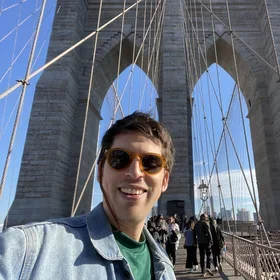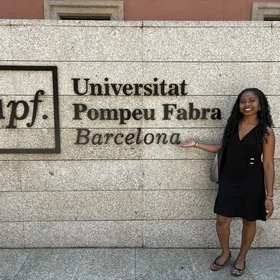With a consistent barrage of headlines about everything that is lost as the world changes, it’s easy to forget that new technology also has the power to bring people and communities together. Like most students at the height of the COVID pandemic, Lelani Pacific-Jack had to connect with her classmates online and adapt to a remote learning format. Rather than being discouraged by that experience, she came away with a profound interest in the application of technological solutions for unprecedented global challenges. As a Columbia SPS CUNY Fellow and a student in the M.S. in Technology Management program, Pacific-Jack is bridging her interests in tech innovation and diplomacy with a focus on U.S.-Japan relations to explore thoughtful uses of technology in responding to international issues.
The Columbia SPS CUNY Fellowship program was launched in early 2024 to provide high-achieving, recent City University of New York (CUNY) bachelor’s or master’s degree recipients with access to Columbia’s vast academic, professional, and community resources. The fellowship provides a full-tuition scholarship for six semesters in any one of the School’s graduate programs, helping to remove the financial barrier to earning a master’s degree.
We spoke to Pacific-Jack about the diverse cultural experiences that inform her work and how SPS is helping her achieve her goals.
What brought you to the M.S. in Technology Management program?
Starting college at the height of the pandemic was a challenge that shaped my path to the M.S. in Technology Management program. The transition to distance learning required me to rapidly adapt to new technology, sparking a deep curiosity about how innovative digital solutions are developed to meet unprecedented challenges. This experience taught me about resilience and inspired a passion for the transformative power of technology.
My fascination with innovation grew further during my fellowship in Japan, where I saw how technology enhances efficiency and integrates seamlessly into daily life. Witnessing these advancements solidified my desire to explore how technology can drive global solutions and improve industries worldwide. These experiences, combined with my work as a researcher at the Consulate General of Japan in New York and my upbringing in the culturally rich environments of both Brooklyn and Trinidad and Tobago––places with different levels of access to technology––motivated me to pursue this degree.
What piqued your initial interest in Japan?
My fascination with Japanese culture was sparked in early childhood through anime, manga, and gaming, where I connected with like-minded online communities and immersed myself in Japanese storytelling and creativity. In high school, participating in Model United Nations fueled my interest in global affairs and cultural diplomacy.
Later, as a political science major, I developed a deeper appreciation for U.S.-Asia relations, which gave me a broader context for understanding Japan’s pivotal role on the international stage. I also learned Japanese in college, which was one of the most challenging yet rewarding experiences of my life. These experiences not only strengthened my admiration for Japan’s rich culture but also shaped my desire to explore it further through research.
Can you tell us about your experience with the Japan U.S. Friendship Commission Summer Institute fellowship (JUSFC)?
The Summer Institute was an incredibly enriching and transformative experience for me. I was one of just 15 students selected across the U.S. for the inaugural cohort, which made the program feel even more special. It immersed me in the heart of U.S.-Japan relations, focusing on leadership and cross-cultural understanding.
What also grew during the program was my interest in technology. Visiting an anime studio, I saw firsthand how Japan is merging traditional artistry with cutting-edge digital tools, which got me thinking about the role of technology in creative industries. Moreover, observing Japan’s leadership in robotics, AI, and sustainable technology during my visits to the prime minister's office and institutions like Sophia University showed me how tech is driving global progress.
What does the CUNY SPS Fellowship mean to you, and what do you hope to accomplish during your time at SPS?
The CUNY SPS Fellowship offers an opportunity for me to advance towards becoming a leader at the intersection of technology and global policy. I’m excited about the chance to build a strong network of peers and mentors who share my interests and can provide invaluable guidance. This fellowship will help me develop the skills and connections needed to shape the future of international policy in a tech-driven world.
What has been the most valuable takeaway from your time at SPS so far?
The most valuable takeaway has been the strong sense of community. The support from my peers has been incredible—they genuinely encourage and uplift each other. This collaborative environment has had a significant impact on my growth, both academically and personally. It’s inspiring to be part of a community that encourages collaboration, and it has helped me feel supported as I pursue my goals.
About the Columbia SPS CUNY Fellowship
In 2024, Columbia University School of Professional Studies (SPS) launched a new fellowship program, the Columbia SPS CUNY Fellowship. Building on the success of the Columbia HBCU Fellowship, this program at SPS aims to provide high-achieving recent CUNY graduates access to Columbia’s vast academic, professional, and community resources.
About the Technology Management Program
Columbia University’s Master of Science in Technology Management is a hands-on technology leadership development program designed to train professionals for equal fluency in tech fundamentals, business operations, and ethical leadership.
The fall 2025 application priority deadline for the Technology Management program is February 15. The final deadline is June 1. The master’s program is available for part-time or full-time enrollment on-campus, and the executive master’s program is offered online with four residencies in New York City. Learn more here.


